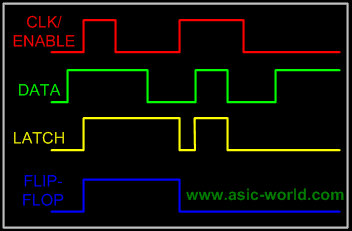Difference Between Latches & Flip Flops?
As part of our group study initiatives, here's a topic suggested by Cranky Here: #-Link-Snipped-#
Discuss the topic in this thread and build up a discussion on the topic. 😀 All the best!
Discuss the topic in this thread and build up a discussion on the topic. 😀 All the best!
Replies
-
 silverscorpionWell, both latches and flip-flops are circuits whose output depends on the inputs and the previous outputs..
silverscorpionWell, both latches and flip-flops are circuits whose output depends on the inputs and the previous outputs..
But the difference is that, a flip-flop will have a clock signal but a latch won't. In other words, latches are used in asynchronous circuits and flip-flops in synchronous circuits.
So, a flip-flop is nothing but a clocked latch! 😀 -
 The RedeemerLatches are level sensitive while flip flops are edge sensitive.
The RedeemerLatches are level sensitive while flip flops are edge sensitive. -
 cranky@silver scorpion,redeemer:so how does a latch work..by saying level triggered,what do we mean?Where does the value change in a latch?
cranky@silver scorpion,redeemer:so how does a latch work..by saying level triggered,what do we mean?Where does the value change in a latch? -
 The RedeemerHi Cranky,
The RedeemerHi Cranky,
By level sensitive we mean that output will respond to change in input as long as the control signal is high. Control signal can be a clock in case of flip flop or any other asynchronous signal in case of latch.
By edge sensitive we mean that output will only respond to input at the point when the control signal goes to high from low. Now when the control signal is high the output will not change with change in input. It will again change at the next rising edge of the clock.
-
 cranky@Redeemer:So what you mean is,when it is high,the output=input?...so where does it get latched?😐
cranky@Redeemer:So what you mean is,when it is high,the output=input?...so where does it get latched?😐 -
 The Redeemer@Cranky
The Redeemer@Cranky
True in case of D latch but not in other latches , take for example the SR latch. In SR latch the latching will take place when the control signal is zero and when the control signal is one the output will change according to the previous values of output and the SR value.
Control S R Q Q'
0 0 0 latch latch
0 0 1 latch latch
0 1 0 latch latch
0 1 1 latch latch
1 0 0 latch latch
1 0 1 0 1
1 1 0 1 0
1 1 1 0 0
@Moderator
Why can't I upload images from my computer? -
 chetan mehrato all,
chetan mehrato all,
my question is:if we take a close look on the k-map simplification for the D flip flop,we see that the output does not depend on the previous outputs, but still we call it a flip flop,why? -
 silverscorpionHmm.. Yeah. The output will not depend on the previous input.
silverscorpionHmm.. Yeah. The output will not depend on the previous input.
In any flip flop or latch, the 'current' output will depend on the 'previous' outputs and the 'current' inputs only. Not on previous inputs..
Is it clear? -
 cranky@above all:thanks
cranky@above all:thanks
Q2:How to start problems that involve designing a counter with frequency/2,f/3 etc. -
 Avishkar GoteLatch is a another term used for flip-flop.Latches are level sensitive while flip flops are edge sensitive and yes both latches and flip-flops are circuits whose output depends on the inputs and the previous outputs..
Avishkar GoteLatch is a another term used for flip-flop.Latches are level sensitive while flip flops are edge sensitive and yes both latches and flip-flops are circuits whose output depends on the inputs and the previous outputs.. -
 Raunak1302
Raunak1302
What do we exactly mean by getting latched??cranky@Redeemer:So what you mean is,when it is high,the output=input?...so where does it get latched?😐 -
 sandeepbangaloreThe example shows D-latch and D-FF.
sandeepbangaloreThe example shows D-latch and D-FF.
The simplest form of data storage is latch. It's output responds immidiately to changes at the input and the input state will be remembered, or "latched" onto. While "enable" input is active the input of the latch is transparant to the output, once "enable" is disactivated the output remains locked. Flip-flops use clock as a control input. The transition on output Q occurs only at the edge of the clock pulse. Input data must present T_setup time before clock edge and remain T_hold time after.
* RESET input, while it is not shown, is present in most FF.
ex: flipflop :
module DFF (Q,_Q,D,clk,rst);
output Q,_Q;
input D,clk,rst;
reg Q,_Q;
always @(posedge clk or posedge rst)
begin
if (rst) Q <= 0;
else Q <= D;
_Q <= !Q;
end
endmodule
*****************************************************************
ex: latch :
module DLatch (Q,_Q,D,en,rst);
output Q,_Q;
input D,en,rst;
reg Q,_Q;
always @(en or D or posedge rst)
begin
if (rst) Q <= 0;
else if (en) Q <= D;
_Q <= !Q;
end
endmodule
*************************************************************
-
 sandeepbangalore@#-Link-Snipped-#
sandeepbangalore@#-Link-Snipped-#
Raunak1302What do we exactly mean by getting latched??
You are reading an archived discussion.
Related Posts
Norton conducted an interesting survey among Indian mobile users and fond out that about 53% users have either lost their mobile phone or have been a victim of phone theft....
I want to paint a wall in my room and want to make it look bright and creative.
It would be great if all you creative souls give me some...
Few days ago ,I was giving presentation on my new website that will be a ecommerce website in my class.
Then I was not able to answer some queries of...
Switch on the TV and all you get to see is ADs! 😕
Most of those ads are pathetic (made by some idiot management guys)
Use this space to share...
Summer is here or going to be here in most parts of India. Where I live, it sometimes get to 50 degree Celsius.
So, give & take a few technical...
